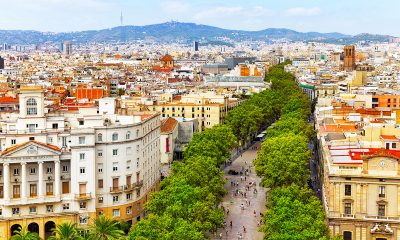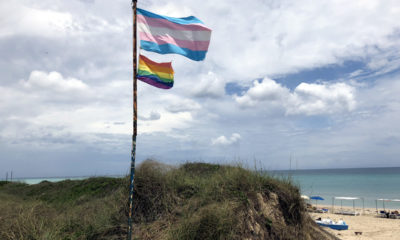Arts & Entertainment
A non-binary Cuban artist is born again in Spain
Nonardo Perea suffered persecution in his homeland
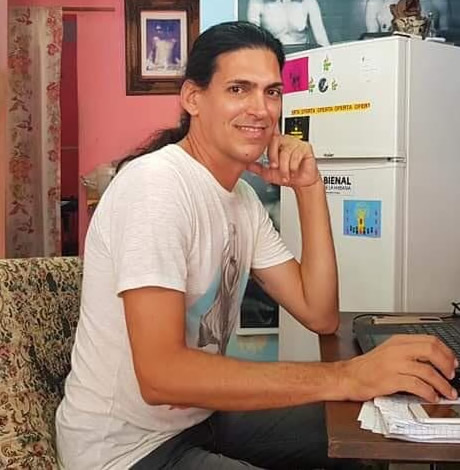
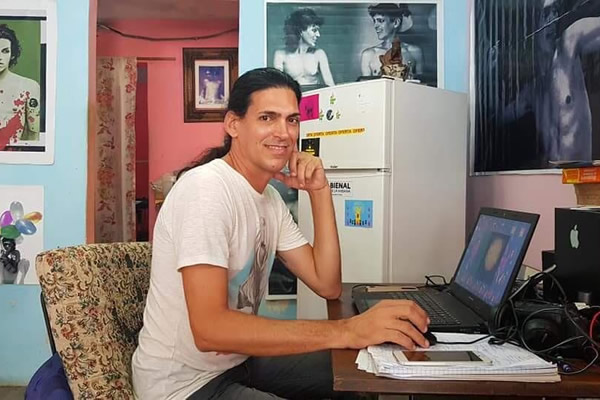
Nonardo Perea lives in Michel’s body. He uses it at will to be vulgar, angelic or diabolical, male or female. Nonardo can be whatever he wants. Michel, shy and withdrawn, hides behinds that alter ego that lends him his face and hands to show the world his claims as an artist.
Nonardo is an invention that comes to life in photographs, video art, performances, stories, installations, journalistic articles, ceramics, and whatever other format is possible, since Nonardo long ago lost any limits. His mind lost that ability as he reinvented himself as an empirical artist, as no one ever gave him the opportunity to attend art school.
He has been greatly misunderstood, mainly because his pieces overflowed with eroticism and Cuba is still too prudish to appreciate his queer art and his other works the regime has labeled as “politically incorrect.” Michel and Nonardo were discriminated against by society and the dictatorship that governs the country and represses anyone who does not agree with its dogmas.
Nonardo nevertheless overcame those barriers and began creating, without anyone’s guidance. He was first a writer and received some tools once he graduated from the Onelio Jorge Cardoso Literary Training Center in Havana. He won several competitions, such as the 2017 Franz Kafka Prize for his work “Los amores ejemplares” and the 2012 Félix Pita Rodríguez Prize for the novel “Donde el diablo puso la mano.”
In the visual arts, where he is usually very restless, he won the third prize for photography at the GendErotica Festival for “La casa por la ventana 2014” with his Vulgarmente Clásica project. He participated in the Bienal 00, organized by independent artists, with his “En la cama con Nonardo” project and presented Vulgarmente Clásica at Madrid’s La Neomudéjar Museum in 2019.
Nonardo belongs to the San Isidro Movement, a group of independent artists and intellectuals who fight for a democratic Cuba. That battle has also been fought through his art and in pursuit of LGBTQ rights, such as marriage and adoption rights for same-sex couples, and an end to gender violence that remains a problem on the island.
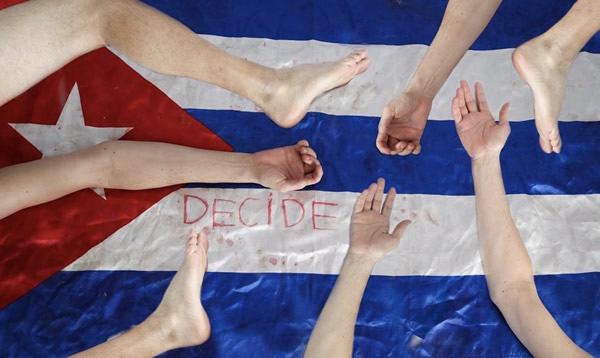
Due to his work and political activism for a truly democratic Cuba, Nonardo suffered police harassment and Cuban state security agents threatened him with jail. Fearing for his life, he took refuge in Spain, a country where he feels he has been reform and from which he speaks with the Washington Blade.
WASHINGTON BLADE: Those who follow your art on social networks and off of them know you as Nonardo, but few know that your real name is Michel. How and why was Nonardo Perea born?
NONARDO PEREA: I remember starting my writing career and I needed another name that was not so common. I did a big search and I didn’t like any of them. I wanted a unique name if possible. One afternoon I was sitting in the living room of my house with my father and I told him about the need for a name. It was he who proposed Nonardo. At first it sounded a bit ugly to me, but then with Perea it seemed a little better. It had strength. I liked it because it began with “no”, denial, and was followed by “nardo”, flower, that is, Nonardo had a lot to do with me. Since then I started using it for all of my work, both literary and audiovisual.
BLADE: How does your artistic training take into account that you are an empirical creator?
PEREA: My artistic creation from the beginning was always very complicated, taking into account that I had to abandon my studies at an early age for inclusion reasons, so I have no academic training; then add to that that I am a very obvious gay. At one point in my teens I was seen as a person who was too feminine. The fact of looking like a woman was a problem when trying to fit in a macho and homophobic society. Where I first tried to break through was in writing. I started by attending literary workshops, where I won several contests quite quickly. I was never exempt from criticism and rejection of the themes that my narrations addressed, which almost always focused on LGBTQ issues and dirty realism. Many times I felt that being the way I am made many uncomfortable. But despite the rejections and bad times that I lived in various periods of my life, I continued doing narrative, and I also began to write articles about social issues for the Havana Times digital newspaper. Then, over time, I had the opportunity to apply to a video journalism workshop in Prague organized by the People in Need organization, and thanks to a woman I love very much, Clara González, who saw some potential in me, I was accepted to participate in the course, in which I learned some video editing, and received help with equipment that helped me to start doing audiovisual work with better quality. All my creative works have been done empirically, and above all I am an artist who works based on improvisation.
BLADE: You have ventured into artistic genres as different as writing, journalism and acting. How do you define yourself as an artist and why?
PEREA: I am a person who cannot be inactive. I spend every day of my life thinking about doing something new. Sometimes I have so many things on my mind, and the fact that I can’t do everything I want to do makes me feel a bit frustrated. I have no words to define myself, I can only say that in some way my creative processes have helped me to cope with the life that I had to live, everything I have done and do has served as a way of escape from reality and everyday life, I could no longer live without creating.
BLADE: In a recent interview you precisely declared that your art was a process of liberating yourself. What exactly do you free yourself from when you create?
PEREA: I free myself from the day-to-day, the everyday, my fears and censorship.
BLADE: In most of your visual works you work with your own image. Why?
PEREA: I use myself as an artistic object because in Cuba I lived in solitude for a long time. I somehow isolated myself and created a space of comfort in my home, a place where I felt more free. The confinement somehow helped me to stay away from society that did not tire of making me feel bad about my obvious homosexual condition in much of my youth. My literary proposals and art in general, on the other hand, were not taken into account. I always perceived that most people underestimated me, and proposing someone to collaborate with me on erotic photographs without receiving anything in return was complicated, and still is. I have control over my body. If I want to undress in a photo or in a video, even if I feel sorry, I strip myself of complexes and do it. If I want to take a photograph that is too vulgar, I also do it. I do not have to request permission from anyone to do so. I don’t put up barriers. I take a risk, then I think that they say what they want. I understand that I am doing a job where I express my personal and social problems, as a human being.
BLADE: You identify yourself as an androgynous person. How many difficulties has that brought you considering that you have lived most of your life and developed your work in Cuba, a country where macho and homophobic ideals still predominate?
PEREA: I consider myself a non-binary androgynous person, because I do not identify with any sex. I can feel at ease as a girl as well as a boy. I have no problem with male or female pronouns. I do not like to victimize myself, but I can tell you that the road has been very difficult, and it has been not only for me, but for many other gays and lesbians who have chosen not to hide their sexual identity in their lives and have had to fight against the world. Being who I am in Cuba has not helped me much in terms of being able to be recognized for my work, but being who I am has helped me to strengthen myself and to understand that I do not need the approval of any institution to continue creating. I am a Cuban artist and like it or not, a large part of my work was created in Cuba.
BLADE: Many Cuban artists prefer to separate their creations from politics and even refuse to give their true judgment on the situation on the island. However, your work has a high dose of activism against the dictatorship and in defense of LGBTQ rights. What consequences, professional and personal, has being an artist labeled by the Cuban regime as “counterrevolutionary” brought you?
PEREA: The main consequence is that I had to go into exile; leave the country where I was born, abandon my mother and family, my friends, my dogs and a lifetime. But I think it had to be that way. There was no other way than to say goodbye, because under no circumstances was I going to allow my creative processes to stop, and above all I was going to continue doing my activism. I know that perhaps I was not going to be able to withstand so much pressure from state security agents, who wanted me to collaborate with them to expose my colleagues from the San Isidro Movement. If I returned to Cuba right now, I don’t know what my life would have been like from that moment on. If being a counterrevolutionary means saying what I think, and being in favor of oppressed minorities, and being against a dictatorship that has left Cuba and its people in a nameless misery for 61 years, then I am a counterrevolutionary and with great honor. I have nothing for which to thank that country, where I was always seen as a freak, and what little I got was thanks to my effort and dedication, because while in Cuba I received criticism and obstacles for everything, for this reason they are collecting what they sowed with me, they do not expect roses from me.
BLADE: In Cuba, to be accepted as part of the official LGBTQ movement you have to share the ideology of the dictatorship, the same one that put equal marriage to a popular vote and represses independent activists. In your opinion, what are the dangers of “politicizing” the struggle of the Cuban gay movement?
PEREA: The danger is in seeing how it becomes politicized. While in Cuba, I never stopped going to the marches staged by CENESEX (the National Center for Sexual Education) and I will not forget how Mariela Castro (CENESEX’s director and the daughter of former Cuban President Raúl Castro) herself politicized those mini-carnival marches with slogans in favor of the five spies imprisoned in the Empire (a reference to the U.S.), and with cries of “socialism yes and homophobia no.” I do not remember seeing any gay or lesbian carrying a sign demanding equal marriage, or demanding freedoms, or a law against gender violence. It is really pathetic considering that the system itself is the number one cause of the persistence of homophobia and constant abuse of people from the community, mainly transgender people, in Cuba, a country where your rights are constantly violated, either because of race or sexual orientation. Those marches were politicized by CENESEX itself in favor of a supposed socialism, which has never worked and will never work because that is a hybrid between communism and underdeveloped capitalism, and we all know that it is nothing other than a dictatorship, and of the crudest in history because it has managed to last for 61 years. If Mariela Castro and all her loyal followers politicize the march for their benefit, I don’t see why the community cannot independently arm its own fight in favor of the most basic rights of the LGBTQ community in Cuba.
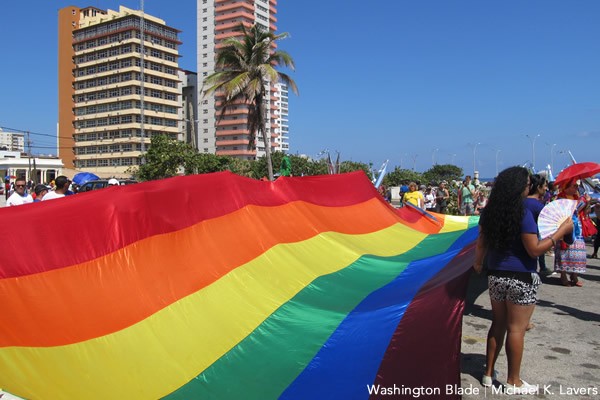
BLADE: In what way has the forced exile that you have faced in Spain changed your work?
PEREA: Right now I continue to do what I want to do, regardless of being in Spain. I still feel that I am in Cuba. My vision as an artist has not changed much. I’ve only been here a year and seven months, although I believe that wherever I am, in some way my work will be linked to that of the island because I have not yet cut that umbilical cord that links me to the place where I was born and took my first steps. It is true that one acquires other mechanisms of creation and invoicing in the work while abroad, but at the moment I do not think that the focus of my work has changed much because of being in another country. Of course, here in Europe there are other problems that I may be able to take advantage of, but be that as it may, they will be appreciated from the perspective of an exiled Latin American artist.
BLADE: On a personal level, what has it been like to be a gay immigrant in Europe?
PEREA: I am very grateful for Spain, mainly for Madrid, which is the place where I have lived since I arrived in 2019. At the moment, I have not felt discriminated against because of my sexual orientation or because I am a foreigner. I have received emotional and legal support from the NGO Rescate, which welcomed me and where I have received the care that I never had in my own country. With all the social and political problems that may exist, it is in this country where I have somehow been able to know what true freedom is.
BLADE: What can we expect from Nonardo Perea in the near future?
PEREA: I am in another difficult moment in my life right now, because I cannot find a job, and I do not receive any money for my artistic work, so what I do is for the love of art and because I cannot stop building my own world. The COVID situation has managed to make things more difficult, not only for me but for everyone, but taking into account that I am an exile and that I have been here for a short time, it is very complicated. Even so, I eventually continue to make video art for the Vulgarmente Clásica audiovisual project, which I have been doing for several years. And more recently I started with a new project, “Maricón Tropical: Living in Madrid”, this one is a bit more comprehensive not to call it ambitious because I insert various artistic manifestations: Performance, audiovisual, literature, drawing and photography, and it is focused on my new life as an exile in Madrid, everything seen from a self-referential point of view, as are almost all my proposals.
BLADE: If you had to create a work that describes your life right now, what would it be like?
PEREA: I consider that my life, my true life, has started now, what it was before was not. For the purposes I was born on March 19, 2019, when I set foot in Spain. All the past is left behind. I want to imagine that the past was a bad dream. My “Maricón Tropical: Living in Madrid” project is a work that somehow reflects that past, which is unfortunately impossible to forget and it is also good that people know what that other life was like, but I focus more on the present, my current problems as a person who faces a new life as an adult who feels like a newborn. I can only tell you that my life’s work is in progress.
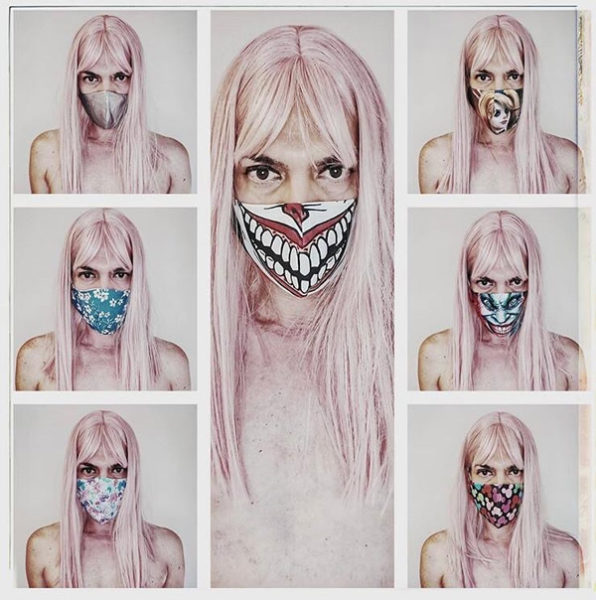

The fifth annual Fredericksburg Pride march and festival was held on Saturday, June 28. A march through the streets of downtown Fredericksburg, Va. was followed by a festival at Riverfront Park.
(Washington Blade photos by Michael Key)



















India
Anaya Bangar challenges ban on trans women in female cricket teams
Former Indian cricketer Sanjay Bangar’s daughter has received support

Anaya Bangar, the daughter of former Indian cricketer Sanjay Bangar, has partnered with the Manchester Metropolitan University Institute of Sport in the U.K. to assess her physiological profile following her gender-affirming surgery and undergoing hormone replacement therapy.
From January to March 2025, the 23-year-old underwent an eight-week research project that measured her glucose levels, oxygen uptake, muscle mass, strength, and endurance after extensive training.
The results, shared via Instagram, revealed her metrics align with those of cisgender female athletes, positioning her as eligible for women’s cricket under current scientific standards. Bangar’s findings challenge the International Cricket Council’s 2023 ban on transgender athletes in women’s cricket, prompting her to call for a science-based dialogue with the Board of Control for Cricket in India and the ICC to reform policies for transgender inclusion.
“I am talking with scientific evidence in my hand,” Bangar said in an interview posted to her Instagram page. “So, I hope, this makes an impact and I will be hoping to BCCI and ICC talking with me and discussing this further.”
On Nov. 21, 2023, the ICC enacted a controversial policy barring trans women from international women’s cricket. Finalized after a board meeting in Ahmedabad, India, the regulation prohibits any trans player who has experienced male puberty from competing, irrespective of gender-affirming surgery or hormone therapy. Developed through a 9-month consultation led by the ICC’s Medical Advisory Committee, the rule aims to safeguard the “integrity, safety, and fairness” of women’s cricket but has drawn criticism for excluding athletes like Canada’s Danielle McGahey, the first trans woman to play internationally. The policy, which allows domestic boards to set their own rules, is slated for review by November 2025.
Bangar shared a document on social media verifying her participation in a physiological study at the Manchester Metropolitan University Institute of Sport, conducted from Jan. 20 to March 3, 2025, focused on cricket performance. The report confirmed that her vital metrics — including haemoglobin, blood glucose, peak power, and mean power — aligned with those of cisgender female athletes. Initially, her fasting blood glucose measured 6.1 mmol/L, slightly above the typical non-diabetic range of 4.0–5.9 mmol/L, but subsequent tests showed it normalized, reinforcing the study’s findings that her physical profile meets female athletic standards.
“I am submitting this to the BCCI and ICC, with full transparency and hope,” said Bangar. “My only intention is to start a conversation based on facts not fear. To build space, not divide it.”
In a letter to the BCCI and the ICC, Bangar emphasized her test results from the Manchester Metropolitan University study. She explained that the research aimed to assess how hormone therapy had influenced her strength, stamina, haemoglobin, glucose levels, and overall performance, benchmarked directly against cisgender female athletic standards.
Bangar’s letter to the BCCI and the ICC clarified the Manchester study was not intended as a political statement but as a catalyst for a science-driven dialogue on fairness and inclusion in cricket. She emphasized the importance of prioritizing empirical data over assumptions to shape equitable policies for trans athletes in the sport.
Bangar urged the BCCI, the world’s most influential cricket authority, to initiate a formal dialogue on trans women’s inclusion in women’s cricket, rooted in medical science, performance metrics, and ethical fairness. She called for the exploration of eligibility pathways based on sport-specific criteria, such as haemoglobin thresholds, testosterone suppression timelines, and standardized performance testing. Additionally, she advocated for collaboration with experts, athletes, and legal advisors to develop policies that balance inclusivity with competitive integrity.
“I am releasing my report and story publicly not for sympathy, but for truth. Because inclusion does not mean ignoring fairness, it means measuring it, transparently and responsibly,” said Bangar in a letter to the BCCI. “I would deeply appreciate the opportunity to meet with you or a representative of the BCCI or ICC to present my findings, discuss possible policy pathways, and work towards a future where every athlete is evaluated based on real data, not outdated perceptions.”
Before her transition, Bangar competed for Islam Gymkhana in Mumbai and Hinckley Cricket Club in the U.K., showcasing her talent in domestic cricket circuits. Her father, Sanjay Bangar, was a dependable all-rounder for the Indian national cricket team from 2001 to 2004, playing 12 test matches and 15 One Day Internationals. He later served as a batting coach for the Indian team from 2014 to 2019, contributing to its strategic development.
Cricket in India is a cultural phenomenon, commanding a fanbase of more than 1 billion, with more than 80 percent of global cricket viewership originating from the country.
The International Cricket Council, the sport’s governing body, oversees 12 full member nations and more than 90 associate members, with the U.S. recently gaining associate member status in 2019 and co-hosting the 2024 ICC Men’s T20 World Cup. The BCCI generated approximately $2.25 billion in revenue in the 2023–24 financial year, primarily from the Indian Premier League, bilateral series, and ICC revenue sharing. The ICC earns over $3 billion from media rights in India alone for the 2024–27 cycle, contributing nearly 90 percent of its global media rights revenue, with the BCCI receiving 38.5 percent of the ICC’s annual earnings, approximately $231 million per year.
Women’s cricket in India enjoys a growing fanbase, with over 300 million viewers for the Women’s Premier League in 2024, making it a significant driver of the sport’s global popularity. The International Cricket Council oversees women’s cricket in 12 full member nations and over 90 associate members, with the U.S. fielding a women’s team since gaining associate status in 2019 and competing in ICC events like the 2024 Women’s T20 World Cup qualifiers. The BCCI invests heavily in women’s cricket, allocating approximately $60 million annually to the WPL and domestic programs in 2024–25, while contributing to the ICC’s $20 million budget for women’s cricket development globally. India’s media market for women’s cricket, including WPL broadcasting rights, generated $120 million in 2024, accounting for over 50 percent of the ICC’s women’s cricket media revenue.
“As a woman, I feel when someone says that they are women, then they are, be trans or cis. A trans woman is definitely the same as a cis woman emotionally and in vitals, and specially, when someone is on hormone replacement therapy. Stopping Anaya Bangar from playing is discrimination and violation of her rights. It is really sad and painful that every transwoman need to fight and prove their identity everywhere,” said Indrani Chakraborty, an LGBTQ rights activist and a mother of a trans woman. “If ICC and BCCI is stopping her from playing for being transgender, then I will say this to be their lack of awareness and of course the social mindsets which deny acceptance.”
Chakraborty told the Blade that Bangar is an asset, no matter what. She said that the women’s cricket team will only benefit by participation, but the discriminating policies are the hindrance.
“Actually the transgender community face such discrimination in every sphere. In spite of being potent, they face rejection. This is highly inhuman. These attitudes is regressive and will never let to prosper. Are we really in 2025?,” said Chakraborty. “We, our mindset and the society are the issues. We, as a whole, need to get aware and have to come together for getting justice for Anaya. If today, we remain silent, the entire community will be oppressed. Proper knowledge of gender issues need to be understood.”
The BCCI and the International Cricket Council have not responded to the Blade’s repeated requests for comment.
Theater
‘Andy Warhol in Iran’ a charming look at intersection of art, politics
Mosaic production plumbs kidnapping plot of iconic artist for humor

‘Andy Warhol in Iran’
Through July 6
Mosaic Theater Company at Atlas Performing Arts Center
1333 H St., N.E., WDC
$70
Mosaictheater.org
Behind the blasé veneer, Andy Warhol was more curious than people knew. Particularly when it came to money. He kept a close eye on how the ultra-rich lived, what fellow artists were being paid and who was paying them, and, of course, all the new and more saleable ways of making and selling art.
In playwright Brent Askari’s “Andy Warhol in Iran,” now playing at Mosaic Theater Company, Warhol (Alex Mills) is brought outside of his usual area of interest when he lands face to face with a young revolutionary. While Warhol could be artistically revolutionary, he didn’t connect with the idea of forgoing the pursuit of money and fame for the infinitely more difficult task of achieving social justice.
The 90-minute play is not fully factual, but rather inspired by Warhol’s real life 1976 trip to Tehran to make portraits of the royal Pahlavi family in the waning days of their reign, with a focus on Farah Diba, the Shah’s elegant wife and Iran’s last empress.
The action unfolds in a Tehran hotel suite boasting a glorious view of the snowcapped Alborz Mountains not far from Iran’s vibrant and bustling capital. It’s here, disguised as room service, that Farhad (played by Nathan Mohebbi) gains entrance to Warhol’s rooms, seeking to kidnap the pop art star to garner attention for the university students’ movement.
Warhol meets the armed intruder with a sort of wide-eyed wonderment, flummoxed why he has been selected for abduction. Warhol can’t understand why a young man like Farhad wouldn’t prefer to be paid a big ransom on the spot, or be cast as a star in one of the Warhol Factory flicks.
When Farhad replies it’s because Warhol is the most decadent artist in the world, Warhol mistakenly takes it for the ultimate compliment. After all, his biggest successes had been connected to celebrity and consumerism (think Campbell’s Soup Cans. 1962).
For Warhol, decadence is aspirational. He made portraits of financiers, movie stars, and jet setters. In fact, he’d been obsessed with the lives of the rich and famous since he was a small kid in Pittsburgh thumbing through Photoplay Magazine while bed bound with Saint Vitus Dance.
Accompanying Warhol to Tehran (unseen) are his business manager Fred Hughes, and Bob Colacello, editor of Interview magazine. Together, they make a merry trio of gay social climbers. These kinds of trips were a boon to the artist. Not only did they solidify a new strata of high society contacts, but were also superbly lucrative, thickly padding the painter’s pockets.
While in Iran, Warhol wanted only to view Farah’s vast world-class collection of jewels, sample the caviar on tap, and get his Polaroids. Then he’d fly first class back to New York and transfer the images to silk screen and sell the portraits to the Persian royals at a hefty price. He didn’t foresee any obstacles along the way.
Serge Seiden’s direction is spot on. He’s rendered a wonderfully even two-hander with a pair of terrifically cast actors. And Seiden plumbs the piece for humor mostly drawn from the absurdity of the situation without missing any of the serious bits.
As Warhol, out actor Mills is instantly recognizable as the eccentric artist. He’s wearing the button-down shirt, jeans, blazer, glasses, and, of course the famed shock of white hair wig (here a little more Karen than Andy). His portrayal is better than an imitation. He gives a bit of the fey and confused, but has also infuses him with a certain dynamism.
The energy works well with the intensity of Mohebbi’s would-be kidnapper Farhad. And while it isn’t a romance, it’s not impossible to think that Warhol might fall for a handsome male captor.
The connection between art and politics is almost always interesting; and though not a super deep dive into the era or the life of an artist, “Andy Warhol in Iran” is a compelling, charming, and sometimes funny glimpse into that intersection.
-

 U.S. Supreme Court3 days ago
U.S. Supreme Court3 days agoSupreme Court upholds ACA rule that makes PrEP, other preventative care free
-

 U.S. Supreme Court3 days ago
U.S. Supreme Court3 days agoSupreme Court rules parents must have option to opt children out of LGBTQ-specific lessons
-

 India5 days ago
India5 days agoIndian court rules a transgender woman is a woman
-

 National4 days ago
National4 days agoEvan Wolfson on the 10-year legacy of marriage equality

